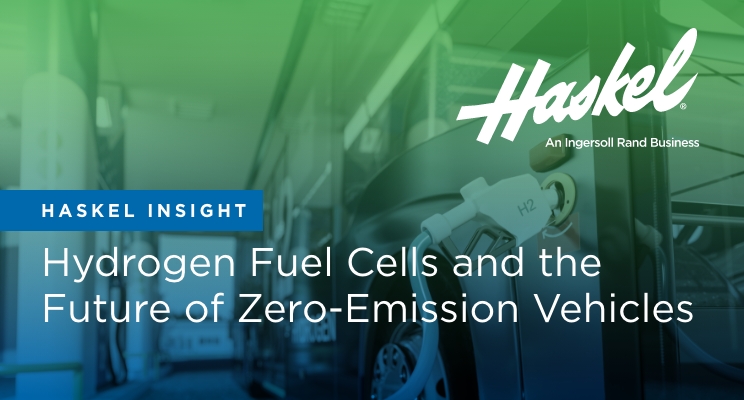Hydrogen Fuel Cells and the Future of Zero-Emission Vehicles

The Battery Electric Vehicle (BEV) revolution is well underway, and many are now looking to hydrogen fuel cells as the ultimate zero-emission transportation fuel. Hydrogen fuel cells offer a more efficient and sustainable alternative to lithium-ion batteries used in many BEV's today, and they can be used in a range of vehicles—from small passenger cars to commercial planes. Plus, if even a fraction of the pace of innovation on green hydrogen extraction stays true, the use of hydrogen as a fuel source will easily overtake all other methods.
Hydrogen is clearly going to be part of our pathway, and seeing how fuel cells and hydrogen work together is key. Fuel cells are not new technology and have been used in space exploration for years, they even helped send NASAs Apollo missions to space! Lets look at how they work and why they could be the answer to a greener future.
Hydrogen fuel cells offer several advantages over lithium batteries. The most essential difference between the two are: a fuel cell generates energy by converting available fuel, whereas a battery stores energy which it then uses. To make a fuel cell work, hydrogen is stored in onboard tanks and converted to electricity via that fuel cell. The electricity is then stored and run through an electric motor. Fuel cells are similar to batteries in that they produce electricity without combustion or emissions. Unlike batteries, fuel cells do not run down or need to recharge—as long as there’s a constant source of fuel (hydrogen) and oxygen.
When it comes to heavy-duty long-range transportation, there's a big advantage to using fuel cells: Hydrogen is much more energy dense than batteries and will weigh less in a truck or bus with a fuel cell engine than with a battery engine. For example, for a BEV truck can complete up to 800kilometers on one charge, so can a FCEV, however there is a huge difference in weight just from the removal of the batteries, which are replaced with lightweight Hydrogen storage tanks on the FCEV, let’s not also forget that you can refill a Hydrogen truck in 10-12 minutes! Significantly quicker than the hours it might take to charge the equivalent BEV.
Hydrogen fuel cells are much more efficient than the equivalent battery powered vehicles. A hydrogen fuel cell can generate twice as much power as an equivalent lithium-ion battery. Hydrogen can also be produced from renewable sources, like solar or wind energy, making it an environmentally friendly option for powering vehicles. In fact, recent innovations surrounding the extraction of hydrogen from ammonia show the biggest promise of a truly green and sustainable fuel source.
That’s in stark contrast to the drain on natural resources that producing a typical BEV's battery poses with the mining and use of lithium. Some say the demand for lithium will outpace supply by 2030, if not sooner.
Another advantage of using hydrogen fuel cells is the refuelling speed, they match what the end user would expect from a traditional gasoline station and can be filled in a matter of minutes. BEV’s despite recent developments still take a great deal longer, in most cases it can take many hours and the larger the vehicle, the longer the charging might take!
FCEV’s are ideal for the transition away from BEV, whilst BEV might be a temporary fix, long term solutions rely on hydrogen. This is one reason why recent projections estimate there will be around 10,000 hydrogen refueling sites globally by 2030. That represents a roughly tenfold increase in the next seven years.
Simply put, hydrogen is here to stay and it’s gaining more and more traction every day—and for good reason.
Despite its numerous benefits, there are still some challenges associated with using hydrogen fuel cells as an alternative energy source. While the technology has improved in recent years, it’s still relatively expensive compared to other options such as battery power or even gasoline engines. For example, on a volumetric basis, hydrogen only has one-sixth of the energy output per liter as gasoline does. Meaning, a lot of hydrogen is needed to meet the power demand; consequently, it’s vital that compressing hydrogen into onboard tanks is done as efficiently as possible.
Additionally, infrastructure for fueling these vehicles is still limited; there are only a few hundred public fueling stations worldwide at present despite that number being expected to increase drastically in the future.
Haskel Is “All In” on Hydrogen
Certainly, hydrogen fuel cells represent an exciting opportunity for the future of zero-emission transportation. Their efficiency and sustainability make them an ideal choice for powering vehicles ranging from cars to planes and beyond. While there are still some challenges that need to be addressed before they become widely adopted, there’s no doubt that this technology will revolutionize the way we move around our cities and countries in the coming years.
That’s why Haskel, as the proven, global high-pressure expert, continues to be ideally placed to support hydrogen refueling requirements around the world. On top of providing the design, build, and maintenance support across the life of hydrogen refueling stations, and the components that have been used in over 200 hydrogen refueling projects around the world, Haskel is developing even more. We are currently working to patent and announce compression methodologies that will make hydrogen fueling up to 25% more efficient than ever before.
If you’d like to learn more about how we support the global hydrogen fueling infrastructure, connect with a Haskel hydrogen expert today!
 Global (EN)
Global (EN)